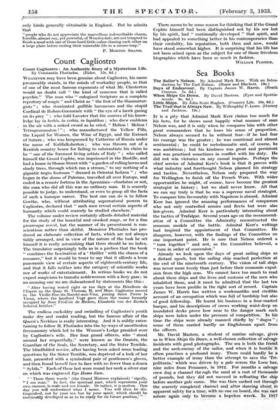Count Cagliostro
Count Cagliostro : An Authentic Story of a Mysterious Life. By Constantin Photiades, (Rider. 125.6d.)
WHATEVER may have been genuine about Cagliostro, his name presumably stands, in the minds of workaday people, as that of one of the most famous exponents of what Mr. Chesterton would no doubt call the kind of nonsense that is called psychic." The man who " eulogized Scripture as a complete repertory of magic " and Christ as " the first of the thaumatur- gists " ; who dominated gullible baronesses and the stupid Cardinal de Rohan-Guemenee with " the eye of a hawk gazing on its prey " ; who told Lavater that the sources of his know- ledge lay in herbis, in verbis, in lapidibus ; who drew emblems in the air with a naked sword as he cried, " Helion ! Melion I Tetragrammaton ! " ; who manufactured the Yellow Pills, the Liquid for Women, the Wine of Egypt, and the Extract of Saturn ; who was lampooned by Catherine of Russia under the name of Kalifalksherton ; who was thrown out of a Kentish country house for failing to substantiate his claim to be " one of the foremost living artists of Italy " ; who called himself the Grand Cophte, was imprisoned in the Bastille, and had a house in Sloane Street with " a garden of rolling lawns and shady trees, through which ran a stream," to say nothing of a gigantic negro footman " dressed in Oriental fashion " ; who began in the slums of Palermo, travelled all over Europe, and ended in a remote fortress in the Apennines—charlatan or not, the man who did all this was no ordinary man. It is scarcely possible to judge, to understand, or even to grasp all the facts of such a baroque career. The best one can do is to follow Goethe, who, without attributing supernatural powers to Cagliostro, declared that " such men reveal certain aspects of humanity which could scarcely be studied elsewhere."
The volume under review certainly affords detailed material for the study of the boastful and crooked mage, or for a fine picaresque novel, but the manner of its presentment is con- scientious rather than skilful. Monsieur Photiades has pro- duced an elaborate collection of facts, which are not always tidily arranged, and in view of the nature of the task he set himself it is really astonishing that there should be no index. The translator surprisingly tells us in a preface that the book " combines the fascination of a thriller' with the charm of a romance," but it would be truer to say that it affords a loose panoramic view of certain aspects of eighteenth-century life, and that it falls neither into the category of scientific works nor of works of entertainment. In serious books we do not expect magicians to transfix noblewomen with a fiery gaze; in an amusing one we are disheartened by statements like this " After having rested eight or ten days at the Hotellerie de l'Esprit on the Quay St. Thomas, M. and Mme. Cagliostro moved to the Vieille.Rue-du-Marche-aux-Vins' joining Saint Pierre le Vieux, where the landlord Vogt gave them the rooms formerly occupied by Jean Fred6ric de Modem, Elisabeth von der Recke's beloved brother."
The endless cuckoldry and swindling of Cagliostro's youth make dry and sordid reading, but the famous affair of the Queen's Necklace is really interesting. And it is mildly enter- taining to follow M. Photiades into the by-ways of unorthodox freemasonry which led to the Women's Lodge presided over by Cagliostro's wife. Her four grand officers, who " stood around her respectfully," were known as the Oratrix, the Guardian of the Seals, the Secretary, and the Sister Terrible. The blindfolded novice, after having been asked some leading questions by the Sister Terrible, was deprived of a lock of her hair, presented with a symbolical pair of gentlemen's gloves, and then found herself face to face with no fewer than a dozen " Sybils." Each of these last wore round her neck a silver star on which was engraved Ego Homo Sum.
" ' These three words ' (the Grand Mistress explained) ' signify, " I am man." In fact, the spiritual part, which represents your own essence, is male and not female. Or rather, it is sexless. 0118 day you will understand what I mean. You will then be dis- tinguished, not by your sex but by your spirit, which should be continually developed so as to be ready for its future position."" There .seems to be some reason for thinking that if the Grand Cophte himself had been distinguished not by his sex but by his spirit, had " continually developed " that spirit, and had appealed to something better in his contemporaries than their credulity, his reputation, both then and now, would have stood somewhat higher. It is surprising that his life has not been seized upon as the subject for one of those frivolous biographies which have been so much in fashion.
PLOMER.




































 Previous page
Previous page